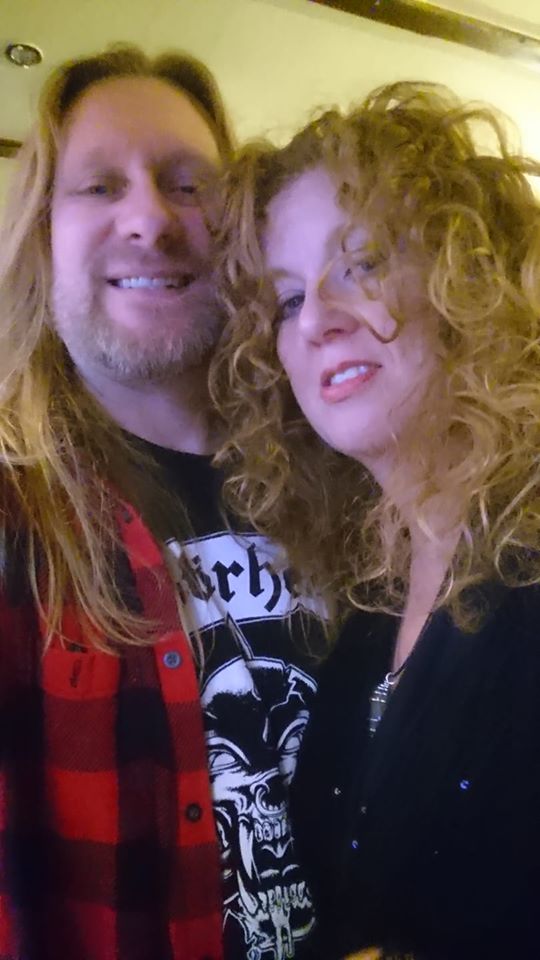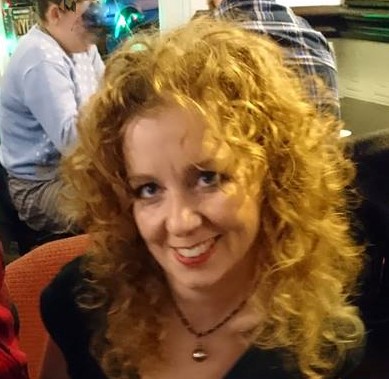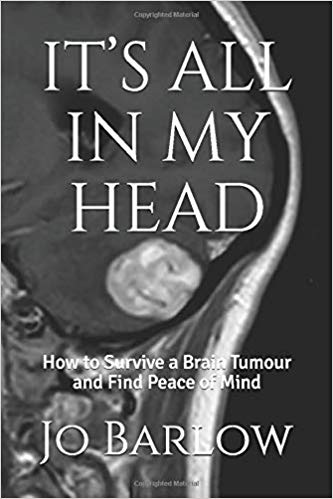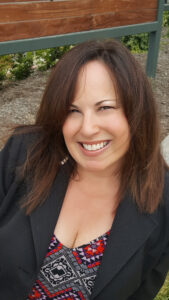Hiya Jo. I’m chuffed to bits to have the opportunity to interview you about your book; IT’S ALL IN MY HEAD: How to Survive a Brain Tumour and Find Peace of Mind.
First, I just have to say that as I was reading your book; I could feel what a remarkable woman, wife, and mother you are!
Second, I enjoyed how you interwove your metaphysical beliefs and strong intuition through what seemed (at least for the first few months) to be a mystery diagnosis.
I commend you for staying true to yourself. It wasn’t until years after my own diagnosis that I learned how to advocate for myself the way you did from the get-go. It took a brain tumour to slow me down and force me to listen to my body and this has now become a central part of my own message for anyone who will listen.
You selected the perfect quote to set the tone for your book:
“We must see all scars as beauty. Okay? This will be our secret. Because take it from me, a scar does not form on the dying. A scar means, “I survived.”
– From Little Bee: A novel, Chris Cleave
I appreciated the way you chronicled your journey beginning in December of 2015 and ending in August of 2017. It made it easy to follow your timeline.
You provided an excellent example (for anyone battling a chronic illness) of listening to your body and advocating for yourself. You also kept meticulous notes about your symptoms which ultimately played a major role in identifying your brain tumour. I was impressed that you were able to keep such detailed notes and I state it here because I believe that kind of note-taking and summarization was critical to the eventual discovery of your brain tumour. For instance, you wrote, “For the 29 days of February I have written down I have had 23 days of bad dizziness and 18 days with severe head pains, neck pounding or headache. Whatever it is – it’s getting worse.”
So now, without any further ado… on to my questions:
Wendy: Can you please summarize what happened and how your suspicion that you were experiencing signs of a brain tumour was eventually confirmed?
Jo: It started with strange sharp pains in my neck, which I thought was caused after I painted a ceiling, then gradually I started feeling a little wobbly or dizzy, or like I was really tired or had just woken up. One day it was so bad I felt unable to drive as I felt so ‘out of it’, again this gradually got worse so that driving at 20 mph felt like I was doing 70! My brain wasn’t coping with ‘something’. I’d also started having headaches daily, and within a few weeks, they were waking me at night. As I literally never have headaches, I knew something was up, but the GP just kept saying it was only a headache. It gradually got that I was unable to do more than move from my bed to the sofa from pain, yet still, the GP dismissed my concerns.
My parents then paid for me to see a private doctor, who almost instantly said I needed a brain scan as I was ‘drunk when not drunk’. I had this two days later and was called back that afternoon to see him, where he showed me the scan of a 3cm tumour in my cerebellum. Telling me not much more than I needed urgent brain surgery.
Wendy: So after months of going to the GP and spinning your wheels, you were suddenly told your situation was urgent but you were given very little information. That must have been extremely scary.
Throughout the book, you spoke about having to grapple with your distrust of doctors and the medical profession in general. You explained that your distrust was due to being prescribed antibiotics for acne as a teen for seven years! You communicated how taking antibiotics for such a long time wreaked havoc on your body especially your digestive system. Can you please share with the readers how you eventually came to accept the fact that you needed to let go and trust your brain surgeon and the other medical professionals involved in your case as you realized there wasn’t a homeopathic way for you to cure the brain tumour on your own?
Jo: It wasn’t just homeopathy I was looking at, but any ‘more natural’ treatment. I asked on several alternative health groups and although there were some vague stories of other people’s brain tumour shrinking, or even going, after alternative treatments, (I had not checked the validation of these claims) there was absolutely nothing anyone could give me about shrinking blood vessel tumours, even elsewhere in the body. After a couple of weeks of asking everywhere, feeling continuously worse (although I had massively relieved my headaches from taking food-grade frankincense oil orally), knowing I could no longer be ‘me’ and that my life was failing rapidly … I knew I had to trust.
Wendy: I believe that women, in particular, are often dismissed when sharing brain tumour symptoms (i.e. headaches, anxiety, dizziness, and so forth). When we describe the symptoms to our doctors we are often deemed to be experiencing hormonal changes or misdiagnosed and sent off with various medications. Thankfully, you knew your body well enough to keep pushing and eventually ended up paying for a private MRI which showed you had a Hemangioblastoma (a benign blood vessel tumour) in your cerebellum. You spoke about constantly feeling dizzy and drunk (even though you weren’t drinking). Ironically, feeling drunk (when not drinking) was something I have experienced as well. You spoke about being an empath which I found interesting since I’m an empath too. Prior to reading about your journey, I always credited my drunk feeling to being an empath. It never occurred to me that feeling drunk when others were drinking and I wasn’t may have actually been a brain tumour symptom. What were some of the other symptoms you experienced?
Jo: This was a list I gave to my GP:
- Loss of balance- feel I am on a boat. Hit objects as I walk past, or think I will.
- Legs feel wobbly and weak.
- Hurts when I turn round too fast/far (parking car is hard) then get dizzy.
- Occasional tingling/numbness in neck and head. (Like I’ve been laying on something hard).
- Tightness on top of head, or back of the head.
- Squinting to focus straight.
- Back of head and neck (atlas joint?) pounds at times. Definitely worse hormonally (started during a period and bad with each since- can feel around eyes too).
- Head pains seem worse if I sleep wrong (if laying on my front with a pillow, or tip neck up and back).
- Both headache and unbalance worse when I cough, sneeze or strain.
- Occasional headache on front top of head.
- Started neck pain when painting a ceiling, but vertigo started getting bad a month or so after this.
- Occasionally- Struggle to balance self with eyes- walking seems jolted and makes me feel unbalanced.
- Clumsy!
Plus within a month I added this when I saw the private Doctor:
- When I go to sit down, I have to look down at the floor, sit, then gradually look up. If I don’t, I have severe waves of pain and dizzy after. I feel my eyes flicker.
- Hormonal headache- such a severe pain that I feel I am jolting/twitching when I move my neck, get up, etc.
- Lifting my head when laying on my front is agony! Severe pains, both sharp and ache all around atlas. Feel dizzy. Eyes feel odd and want to just move back and put my head on the floor and cry.
- My neck cracks/grates when I turn it now- been told arthritis by physio- but didn’t have it before December.
- It is now totally taking over my life- I cannot go out alone, panic when I do if get dizzy.
- Headaches starting in night (3am > ) I can’t sleep.
- Driving at night harder- car/streetlights too bright, the road feels it’s ‘coming at me’.
- Don’t feel my legs are connected to body.
- Know I am totally stressed – both physically and mentally. Tired. Tearful. Depressed. Exhausted.
- The worse headaches start with my period- gradually increasing in pain.
- Took paracetamol and used ibuprofen gel which numbed some of the pain but I could still feel it.
- When I had a cold my headache was insane! Couldn’t blow my nose as head felt it would explode. Sitting on the sofa barely able to move and just crying from pain.
- Pains with both period and cold mainly in back -right of atlas, transferring to back of right eye, and sometimes top of head. Huge waves of pain in neck/back of head whenever I moved – so that I felt I was twitching with pain.
Wendy: Wow! That’s a lot!
During your three-month post craniotomy visit with your neurosurgeon, he expressed how amazed he was that you were able to leave the hospital just 48 hours after your craniotomy. You attributed that to some of the natural remedies you were taking and you had some advice for your doctor based on your experience. Can you please share with the readers what you believe helped you to leave the hospital sooner than expected and what advice you provided for your surgeon?
Jo: Homeopathic Arnica and other post-surgery homeopathic remedies were the only things I was able to take while in hospital. (I literally screamed at the staff for them to allow me to take them! Eventually, I was told the pharmacy would allow homeopathy, just not herbal remedies.)
Although I also feel playing my favourite songs on my iPod and being able to be ‘taken away’ from the hospital and fear to a place of happiness, helped massively. I was actually tapping my foot to the music just a few hours after surgery finished!
I told my Neurosurgeon that I believe patients should have Arnica after surgery, Ginger Tea to help the nausea post-op, and Raw or Manuka Honey to help soothe your throat from the anesthetic tube. Plus that I was sure frankincense oil stopped my headaches (from hydrocephalus) before surgery, and that I had since seen medical studies showing Frankincense can actually help reduce hydrocephalus.
Wendy: Sounds like good advice.
Some of the hardest things for many brain tumour survivors to deal with are the deficits we are left with after our craniotomies (and this is consistently the case whether our tumours were malignant or benign). The subject of invisible illnesses often comes up in the brain tumour support groups on Facebook. We look normal on the outside but are often struggling on the inside. I commend you for getting out and trying to resume your life as quickly as possible after your craniotomy. In some cases, you realized that you tried to do too much too soon. I believe many other brain tumour survivors will relate to the following quotes from your book:
“People can’t see my scars, they are hidden in my hair and so they don’t seem to notice.”
“I find it hard when people don’t ask… I find it hard not to tell the world (or anyone I meet) that I am feeling pissed most of the day and night and struggling to cope with the fact I cannot control it at all and I can do nothing else than just trust I am ok. Trust that I am healing. Trust that my tumour (the tumour that I still have not really acknowledged I had) is gone. Trust that one day I will be able to walk and see properly again, have some muscle return and energy back.
Wendy: How are you coping now?
Jo: I have physically healed far more in time, but when I am tired or have physically exhausted myself it can get worse again, as I do with cold weather or hormones.
I still occasionally struggle with head pains, neck tightness, or an itch I cannot scratch that feels its ‘in’ my head, and the left side of my head is always numb when touched. My balance is not back to what it was before my tumour and I am unable to move out the way of things or people quickly, sometimes I still feel just a bit dizzy or unbalanced. My right hand also feels weak and my fingers curl, as well as my vision not being the same since surgery – although I have been told these are not linked to the operation or tumour and are just age! (I feel the surgery aged me)
My thought process takes longer, my memory is not as good (and I need lots of reminders), I cannot multitask, I often say the wrong words or something similar very easily (e.g. plug instead of key), I cannot spell or type as easily I could before, I get neuro fatigue and overstimulated too easily, where it feels like my brain is going to sleep, and I just feel blank.
Wendy: As your story evolved, you were trying to identify possible reasons why you ended up with a brain tumour. You had several realizations and you wrote; “…I believe like many alternative therapists that there is either a physical or emotional cause for ‘most illnesses’.”
I got the feeling that prior to your brain tumour diagnosis, you struggled with people-pleasing and stuffing your emotions. Maybe that was just what I focused on the most since I have always struggled with the same issues. Eventually, you found your voice and were able to be true to your feelings. Toward the end of your book you stated; “Even though I have always been stubborn and done what I want, I still often worried what others thought. Now I really feel that’s 100% ok to be me. It is ok to let others know I am sad, or struggling, or tired or insanely happy.”
Wendy: Why do you think it takes something like a brain tumour for some people to find balance and come to the realization that it is okay for us to be ourselves?
Jo: I think many serious illnesses can do the same and make you appreciate exactly what you have in life and realise when you are not being true to yourself. You no longer want to spend time worrying about life’s trivia. What others think just doesn’t matter, that’s about them, not me.
Wendy: Good point.
In chapter 32 you wrote about lessons of a brain tumour. You said; “This year has been both the worst and best year of my life.” Now that some time has passed, is there anything in that chapter you would change? What are a few of the most important lessons you learned?
Jo: No, I wouldn’t change it. There are places that maybe the wording could be clearer, but it was written during a session of ‘automatic writing’ so it’s exactly as I first wrote it down. Reading this chapter still gives me goosebumps!
The most important lessons I still use daily are:
- I can totally change how I experience the world by my thoughts.
- That I have innate knowledge if I am quiet enough to listen.
- To trust.
Wendy: What else would you like the readers of this post to know?
Jo: My whole ‘brain tumour’ experience was certainly the hardest thing I have ever done in my life, but it is also the experience where I learned the most positive lessons. It has made me a better and happier person, both to myself and, I think, to others.
Please take a look at my book:
Or see my website: www.JoBarlow.co.uk
Or Blog: www.benignbraintumour.blogspot.com
AND… my brand new channel on You Tube

Wendy: Thanks again Jo. I very much enjoyed your book and writing style. You have a knack for metaphors. You are proof that we all have it within ourselves to overcome our deepest fears when we have no other choice.
Following are some additional quotes from your book that I felt compelled to share:
“Feeling an overwhelming sense that I have to do ‘something positive’ with my life now. This is my second chance. Knowing somehow I need to help others- and that I can, if I can just figure out what it might be.”
“I am starting to forget about being a brain tumour patient. It is my history – I am now a brain tumour survivor.”
“I just feel I am having to be so careful all the time, just walking around someone else’s house is like walking through the china department in a shop carrying loads of large bags sticking out everywhere.”
“I feel like I am going round in circles, or insane … the doctors and physiotherapists are telling me I am ok and basically implying ‘it’s all in my head’… when I feel awful and scared.”
“I have been dizzy for six whole months. Half a year! I don’t think unless you have ever experienced this just how much it means to be able to feel ok again. To sit and look at anything without it moving or spinning, thinking that you will fall off your seat when you are firmly sitting on it, bumping into walls, tables, chairs, doors and people almost every single time you walk, having to walk with your arms wide to keep your balance when you do, eating when it feels like you are on a merry go round and can’t find your mouth. The only respite when you have your eyes shut and are laying down. No wonder I am shattered. Every cell of me is exhausted. Yet the nightmare is finally going. Unless I am tired I no longer feel dizzy, wobbly, off balance or spinning. I can shut my eyes standing up and stay there! I never thought I would be able to cope with this, but I have. I did it. I survived what I didn’t think I could.”
“I know I don’t sweat the small stuff as much anymore, I appreciate every hug (well and everything and everyone!) and just the fact my body works now and I don’t feel drunk!!!
“Yet having a brain tumour, a horrendous and terrifying experience, and surviving- even doing really well- changed everything. Knowing that there was something else bigger than just me in this world. Knowing that even in the darkest of torturous days in the hospital I could find that peace when I needed to, or find a technique that took my pain away from my head and took it into my tailbone. That I could go from extreme anxiety and panic to total calm and bliss in a few minutes – purely by changing my thoughts. Change how things felt totally. When I trusted. Oh and I have learnt patience, a tremendous amount of patience. My brain simply forced me to slow down, to focus on that moment and not the past or future, and if I try to go too fast again- it still stops me. I break a foot, my back goes, or I just hit that wall of exhaustion.”



 Hello. My name is Wendy and I’m a recovering workaholic. I'm also a brain tumor/cancer survivor.
The purpose of this blog is to share my experiences, memories, resources, and self-discoveries as I continue to transform from a workaholic into a more balanced person. I have read several books and stories about others who have had similar experiences
Hello. My name is Wendy and I’m a recovering workaholic. I'm also a brain tumor/cancer survivor.
The purpose of this blog is to share my experiences, memories, resources, and self-discoveries as I continue to transform from a workaholic into a more balanced person. I have read several books and stories about others who have had similar experiences 